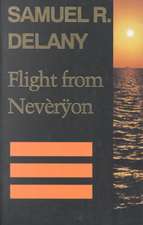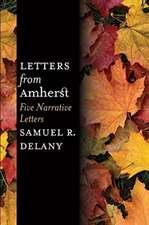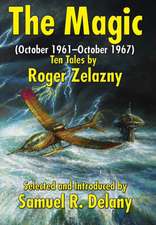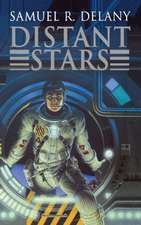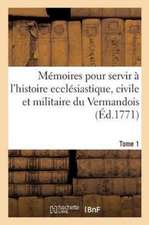The Fall of the Towers
Autor Samuel R. Delanyen Limba Engleză Paperback – 31 ian 2004
Preț: 126.36 lei
Nou
Puncte Express: 190
Preț estimativ în valută:
24.18€ • 25.31$ • 20.01£
24.18€ • 25.31$ • 20.01£
Carte disponibilă
Livrare economică 15-29 martie
Preluare comenzi: 021 569.72.76
Specificații
ISBN-13: 9781400031320
ISBN-10: 140003132X
Pagini: 448
Dimensiuni: 132 x 205 x 24 mm
Greutate: 0.33 kg
Ediția:Vintage Books.
Editura: Vintage Publishing
ISBN-10: 140003132X
Pagini: 448
Dimensiuni: 132 x 205 x 24 mm
Greutate: 0.33 kg
Ediția:Vintage Books.
Editura: Vintage Publishing
Recenzii
“Webs within webs, circles within circles, [Delany’s] imagination…creates a mirror of the oceanic density of our times, and leaves you asking for more.”— The Village Voice
“A grand job…these tales of Samuel Delany’s have a fine, rich strangeness…. Beautifully intricate and gloriously mystifying, all this intricate tapestry of advanced science and decayed society the author has portrayed marvelously well.” --P. Schuyler Miller, Analog Magazine
“A writer of consistently high ambition and achievement…Delany’s fiction demands—and rewards—the kind of close reading that one ungrudgingly brings to the serious novelists….Sentence, phrase by phrase, [he] invites the reader to collaborate in the process of creation. The reader who accepts this invitation has an extraordinarily satisfying experience in store for him/her.” --Gerald Jonas, The New York Times Book Review
“Delany has a fearsomely stocked intellect, and a wider range of experience than most writers can even imagine…. He is brilliant, driven, prolific.” --The Nation
“A grand job…these tales of Samuel Delany’s have a fine, rich strangeness…. Beautifully intricate and gloriously mystifying, all this intricate tapestry of advanced science and decayed society the author has portrayed marvelously well.” --P. Schuyler Miller, Analog Magazine
“A writer of consistently high ambition and achievement…Delany’s fiction demands—and rewards—the kind of close reading that one ungrudgingly brings to the serious novelists….Sentence, phrase by phrase, [he] invites the reader to collaborate in the process of creation. The reader who accepts this invitation has an extraordinarily satisfying experience in store for him/her.” --Gerald Jonas, The New York Times Book Review
“Delany has a fearsomely stocked intellect, and a wider range of experience than most writers can even imagine…. He is brilliant, driven, prolific.” --The Nation
Notă biografică
After his seventh novel Empire Star (1966), Samuel Delany began publishing short fiction professionally with “The Star Pit.” It appeared in Worlds of Tomorrow and was turned into a popular two-hour radio play, broadcast annually over WBAI-FM for more than a decade. Two tales, “Aye, and Gomorrah” and “Time Considered as a Helix of Semi-precious Stones,” won Nebula Awards as best SF short stories of, respectively, 1967 and 1969. Aye, and Gomorrah contains all the significant short science fiction and fantasy Delany published between 1965 and 1988, excepting only those tales in his Return to Nevèrÿon series. A native New Yorker, Delany teaches English and Creative Writing at Temple University in Philadelphia. In July of 2002 he was inducted into the Science Fiction Hall of Fame.
Extras
chapter one
And above the empty stage in the laboratory tower of the dead city of Telphar, the crystal sphere dimmed. The room was silent as it had been for sixty years. From the crystal the metal ribbon soared over the balcony, above wet ashes and puddled roadways. The sun had cleared the ragged horizon. Like the back of a sleeping serpent the dripping metal gleamed.
Miles on, darkness paled before morning. In the lava fields among the ferns sat row behind row of barracks, cheerless as roosting macaws. The light rain had stopped. Water dribbled the supporting pylon. The ribbon made a black band on the fading night.
From the jungle, six people approached the barracks. They were all over seven feet tall. They carried the bodies of two ordinary-sized men. Two behind the others hung back to converse.
"What about the other one, Larta?"
"Koshar? He won't get far." She pushed back her fur cape from her shoulder; the new sun struck the brass circlets banding her upper arm.
"If he does," said the man, "he'll be the first to get through us in twelve years."
"If he makes for the coast and out to Toron," Larta said. "If we don't get him, it means he's gone inland toward the radiation barrier." They passed under the shadow of the transit ribbon. The circlets-and her eyes-darkened. "Then we won't have to worry anyway, if he goes toward Telphar, eh, Ptorn?"
The tall man's head was shaved. "I suppose I'm not really worried about the one escaping." Ptorn glanced at those passing into the sun. "But the increasing number of escape attempts over the last year . . ."
Larta shrugged. "The orders for tetron have nearly doubled." As she left the shadow, the sun lit three parallel scars down the side of her face, under her jaw, and down her neck.
Ptorn slid his right hand beneath his left arm. "I wonder what sort of leeches make their living off these miserable . . ." He didn't finish but nodded ahead.
"The hydroponics growers, the aquarium manufacturers in Toron," Larta said. "They're the ones who call for the ore. Then, there's the preparation for the war."
"They say," mused Ptorn, "that since the aquariums have taken over supplying fish to Toron, the fishermen on the coast have nowhere to sell and are being starved out. And with the increased demand for tetron, the prisoners are dying like flies here at the mines. Sometimes I wonder how they supply enough miners."
"They don't." Now Larta called ahead, "All right. We'll leave the rest to the men"-there was the gentlest contempt in the word "men" that italics would be too strong to convey-"who guard them. We've done our part. Drop them there, in front of the cabin." The rain had made the yard mud. "Maybe that'll teach the others some sort of lesson."
Two dull splashes.
"Maybe," Ptorn said.
But Larta had turned back toward the jungle, shadow from the trees brushing over her face, over the triple scar.
Streaks of sun speared the yellow clouds and pried apart the billowing rifts. Shafts of yellow sank into the lusher forests of Toromon nearer the shore. The light dropped from wet green fronds, or caught in the moist cracks of the boulders. Then dawn snagged on the metal ribbon that lanced above the trees. Webs of shadow from the supporting pylons fell over a lava bed.
A formation of airships flashed through a tear in the clouds like a handful of hurled silver chips. The buzz from their tetron motors descended through the trees. And Lug, who was four feet three inches tall, with a forehead as high as his thumb was wide, looked up from under his bony brow.
The others around him, of the same height and rounded shoulders, grunted to one another. The word repeated most often was "war." Lug motioned the others. They started again, padding over the jungle floor, the palms of their feet shaping to stone and stick and root. Their semi-opposable big toes stroked absently at the textures of the ground as one might thumb the differences, running one's hands over things in the grass.
Finally Lug leaned against a tree trunk. "Quorl?" he said. "Quorl!" he barked.
Behind branches that had been cut down and replanted to form a shapeless shelter, something turned under leaves. The lean-to had no real form from the outside, but was limited like the outside of a bush. You could only be sure it was a shelter when something moved within. A hand grasped one branch, and someone sat up inside.
They watched, whispered, then watched again. Quorl stood, emerging and emerging from the top. His yellow eyes were awake, even though the muscles in his face were settling themselves into place after what must have been a huge yawn. His nostrils rounded under the scents of the morning. Then he smiled-and stepped free of the leaves and branches.
From their stunted heights, they blinked at his seven-foot hugeness. Some only stared at the confusing wonder of his hand hanging by the thumb from his belt; others did not look above the gnarled machinery of his knee. To the neanderthals both were as expressive of marvels as his face.
"Quorl?" Lug asked.
"What is it, Lug?"
"Around the bottom of the mountain by the lake, they've come. Not the ones as big as you, but taller than us. They are like the ones at the mines, the prisoners. But these aren't prisoners, Quorl. They're building."
Quorl nodded. "Good. It seemed time they came. Time they built."
"You have seen them?"
"No."
"Someone else came and told you earlier?"
"No." Quorl's smile was subtly humorous, more subtly regretful. "It was time for them to come. It's simple." For Lug it was just a smile.
They whispered among themselves, awed by the things that the tall ones knew; and smiled back.
"Come," Quorl said. "Take me to see."
Lug looked at the others.
"Yes," Quorl said, stepping away from his shelter. "Come; we will go."
"Why?" asked Lug. "Do you want to talk to them?"
Quorl stretched up, pulled down two kharba fruits, and handed one to a boy, the other to a girl. He pulled down two more, and the leaves shook again. "No," he said. "Let's just go to see." He handed out the other two melons. "Share these."
Lug shrugged, and they all started through the trees. They broke the fruits among them. Two apish boys began to shoot seeds at one another, fell into a scuffle, fell into laughter. Quorl looked back, but they were already catching up.
"Why do we go?" Lug asked again. Such scuffles and laughter were so close to him he did not look, did not see. "You know already that the men"-and there was a slight awe in the word "men" that boldface letters would not quite suggest-"are there, what they are doing. What do you want to see? Will we help them build? Does what they build have anything to do with the war?"
Quorl pushed his hand into Lug's hair and arched his fingers, arched them again. "It rained this morning," he said. Lug bent his neck as Quorl scratched his head. "You know how the lake looks in the morning mist after rain?"
Lug straightened his shoulders, his muscles tensing with pleasure. "Yes." His lips grinned back from yellow teeth. "Yes, I know."
"That's why we go to see," Quorl said. His hand dropped to Lug's shoulder.
Behind them the ribbon crossed the top of the hundred-foot pylon, just visible through the trees.
As dawn slipped across the jungle, more and more of the ribbon gleamed from beneath the receding shadows till at last it soared above the sand that marked the edge of the sea.
Fifty yards down the beach from the last supporting pylon whose base still sat on dry land, Clithon the fisherman emerged from his shack.
"Tel?" he called. He was a wiry man of average height. His face was cracked from sand and wind. "Tel!" Now he turned back into the cottage. "And where has the boy got off to now?"
Grella was already seated at the loom. Her strong hands began to work the shuttle back and forth while her feet stamped the treadle.
"Where has he gone?" Cithon demanded.
"He went out early this morning," Grella said quietly. She did not look at her husband. She watched the shuttle moving back and forth, back and forth, between the green threads.
"I can see he's gone out," Cithon snapped. "But where? The sun is up. He should be out with me on the boat. When will he be back?"
Grella didn't answer.
"When will he be back?" Cithon demanded.
"I don't know."
Outside there was a sound, and Cithon turned abruptly and went to the side of the shack.
The boy was leaning over the water trough, sloshing his face.
"Tel!"
The boy looked up quickly at his father. He was perhaps fourteen, a thin child, with a shock of black hair, yet eyes as green as the sea. Fear had widened them now.
"Where were you?"
"No place," was the boy's quiet, defensive answer. "I wasn't doing anything."
"Where were you?"
"No place," Tel mumbled again. "Just walking and picking up seashells-"
Suddenly Cithon's hand, which had been at his waist, jerked up and then down, and the studded strap that had been his belt slashed over the boy's wet shoulder, slashed again.
The only sound was Tel's gasps.
"Now get down to the boat."
Inside the shack, the shuttle paused in Grella's fist the length of a drawn breath. Then it shot once more between the threads.
-----------------
Down the beach, the transit ribbon leaped across the water. Light shook on the surface of a sea like mica; the ribbon above was dull by comparison.
Dawn reached across the water till at last the early light fell on the shore of an island. High in the air, the ribbon soared above the busy piers and the early morning traffic of the wharf. Behind the piers, the towers of the city were lanced with gold, and as the sun rose, gold light ran down the building faces.
By the sea wall, two merchants were talking above the roar of tetron-powered winches and transports.
"It looks like your boat's bringing in a cargo of fish," said the stout one.
"It could be fish. It could be something else," answered the gaunt one.
"Tell me, friend," asked the portly one, whose coat was of cut and cloth expensive enough to suggest his guesses in business were usually right. "Why do you trouble to send your boat all the way to the mainland to buy from the little fishermen there? My aquariums can supply the city with all the food it needs."
The gaunt merchant looked down at a clipboard of inventory slips. "Perhaps my clientele is somewhat different from yours."
The stout merchant laughed. "You sell to those families of the island who still insist on the doubtful superiority of your imported delicacies. Did you know, my friend, I am superior in every way to you? I feed more people, so what I produce is superior to what you produce. I charge them less money, and so I am financially more benevolent than you. I make more money than you do, so I am also financially superior. Also, later this morning my daughter is coming back from University Island, and this evening I will give her a party so great and so lavish that she will love me more than any daughter has ever loved a father before."
The self-satisfied merchant laughed again, then strolled off down the wharf to inspect a cargo of tetron ore that was coming in from the mainland.
As the merchant of imported fish turned up another inventory slip, a third man approached him. "What was old Koshar laughing about?" he asked.
"He was gloating over his good fortune in backing that hare-brained aquarium idea. He was also trying to make me jealous of his daughter. He's giving her a party tonight to which I am no doubt invited; but the invitation will come late this afternoon with no time for me to reply properly."
The other shook his head. "He's a proud man. But you can bring him to his place. Next time he mentions his daughter, ask him about his son, and watch the shame storm into his face."
"He may be proud," said the other, "but I am not cruel. Why should I move to hurt him? Time takes care of her own. This coming war will see."
"Perhaps," said the other merchant. "Perhaps."
Once over the island city of Toron, capital of Toromon, the transit ribbon breaks from its even course and bends among the towers, weaves among the elevated highways, till finally it crosses near bare concrete, edged with block-long aircraft hangars.
Several airships had just arrived. At the passenger gates the people waiting for arrivals crowded the fence. Among them was a young man in military uniform. A brush of red hair, eyes that seemed doubly dark in his pale face, along with a taurine power in his legs, back, and shoulders; these were what struck you in the swift glance. A close look brought you the incongruity of the major's insignia with his youth.
He watched the passengers coming through the gate eagerly.
Someone called, "Tomar!"
A grin leaped on his face.
"Tomar," she called again. "I'm over here!"
Too bumptiously, he rammed through the crowd until he almost collided with her. Then he stopped, bewildered and happy.
"Hey, I'm glad you came," she said. "Come on. You can walk me back to Father's." Her black hair dropped close to broad, nearly Oriental cheekbones. Then the smile on her strange mouth fell.
Tomar shook his head; they turned, arm in arm, through the people wandering on the field.
"No?" she asked. "Why not?"
"I don't have time, Clea," he answered. "I had to sneak an hour off just to get here. I'm supposed to be back at the Military Ministry in forty minutes. Do you have any bags to carry?"
Clea held up a slide rule and notebook. "I'm traveling light."
"What's that?" He pointed to a picture stuck between the rule and the book cover.
"Oh, this." She handed him the folded chapbook. On the cover was the picture. Tomar frowned, trying to interpret the shapes and their meaning. Inside was a poem. That made him frown more. "I don't know much about this sort of-"
"Look at it," she insisted. "Read it. The poem was written by a boy at school, Vol Nonik. I didn't know him, but he printed a few poems up like this. Someone told me the picture was done by his girlfriend. Her name was-"
And above the empty stage in the laboratory tower of the dead city of Telphar, the crystal sphere dimmed. The room was silent as it had been for sixty years. From the crystal the metal ribbon soared over the balcony, above wet ashes and puddled roadways. The sun had cleared the ragged horizon. Like the back of a sleeping serpent the dripping metal gleamed.
Miles on, darkness paled before morning. In the lava fields among the ferns sat row behind row of barracks, cheerless as roosting macaws. The light rain had stopped. Water dribbled the supporting pylon. The ribbon made a black band on the fading night.
From the jungle, six people approached the barracks. They were all over seven feet tall. They carried the bodies of two ordinary-sized men. Two behind the others hung back to converse.
"What about the other one, Larta?"
"Koshar? He won't get far." She pushed back her fur cape from her shoulder; the new sun struck the brass circlets banding her upper arm.
"If he does," said the man, "he'll be the first to get through us in twelve years."
"If he makes for the coast and out to Toron," Larta said. "If we don't get him, it means he's gone inland toward the radiation barrier." They passed under the shadow of the transit ribbon. The circlets-and her eyes-darkened. "Then we won't have to worry anyway, if he goes toward Telphar, eh, Ptorn?"
The tall man's head was shaved. "I suppose I'm not really worried about the one escaping." Ptorn glanced at those passing into the sun. "But the increasing number of escape attempts over the last year . . ."
Larta shrugged. "The orders for tetron have nearly doubled." As she left the shadow, the sun lit three parallel scars down the side of her face, under her jaw, and down her neck.
Ptorn slid his right hand beneath his left arm. "I wonder what sort of leeches make their living off these miserable . . ." He didn't finish but nodded ahead.
"The hydroponics growers, the aquarium manufacturers in Toron," Larta said. "They're the ones who call for the ore. Then, there's the preparation for the war."
"They say," mused Ptorn, "that since the aquariums have taken over supplying fish to Toron, the fishermen on the coast have nowhere to sell and are being starved out. And with the increased demand for tetron, the prisoners are dying like flies here at the mines. Sometimes I wonder how they supply enough miners."
"They don't." Now Larta called ahead, "All right. We'll leave the rest to the men"-there was the gentlest contempt in the word "men" that italics would be too strong to convey-"who guard them. We've done our part. Drop them there, in front of the cabin." The rain had made the yard mud. "Maybe that'll teach the others some sort of lesson."
Two dull splashes.
"Maybe," Ptorn said.
But Larta had turned back toward the jungle, shadow from the trees brushing over her face, over the triple scar.
Streaks of sun speared the yellow clouds and pried apart the billowing rifts. Shafts of yellow sank into the lusher forests of Toromon nearer the shore. The light dropped from wet green fronds, or caught in the moist cracks of the boulders. Then dawn snagged on the metal ribbon that lanced above the trees. Webs of shadow from the supporting pylons fell over a lava bed.
A formation of airships flashed through a tear in the clouds like a handful of hurled silver chips. The buzz from their tetron motors descended through the trees. And Lug, who was four feet three inches tall, with a forehead as high as his thumb was wide, looked up from under his bony brow.
The others around him, of the same height and rounded shoulders, grunted to one another. The word repeated most often was "war." Lug motioned the others. They started again, padding over the jungle floor, the palms of their feet shaping to stone and stick and root. Their semi-opposable big toes stroked absently at the textures of the ground as one might thumb the differences, running one's hands over things in the grass.
Finally Lug leaned against a tree trunk. "Quorl?" he said. "Quorl!" he barked.
Behind branches that had been cut down and replanted to form a shapeless shelter, something turned under leaves. The lean-to had no real form from the outside, but was limited like the outside of a bush. You could only be sure it was a shelter when something moved within. A hand grasped one branch, and someone sat up inside.
They watched, whispered, then watched again. Quorl stood, emerging and emerging from the top. His yellow eyes were awake, even though the muscles in his face were settling themselves into place after what must have been a huge yawn. His nostrils rounded under the scents of the morning. Then he smiled-and stepped free of the leaves and branches.
From their stunted heights, they blinked at his seven-foot hugeness. Some only stared at the confusing wonder of his hand hanging by the thumb from his belt; others did not look above the gnarled machinery of his knee. To the neanderthals both were as expressive of marvels as his face.
"Quorl?" Lug asked.
"What is it, Lug?"
"Around the bottom of the mountain by the lake, they've come. Not the ones as big as you, but taller than us. They are like the ones at the mines, the prisoners. But these aren't prisoners, Quorl. They're building."
Quorl nodded. "Good. It seemed time they came. Time they built."
"You have seen them?"
"No."
"Someone else came and told you earlier?"
"No." Quorl's smile was subtly humorous, more subtly regretful. "It was time for them to come. It's simple." For Lug it was just a smile.
They whispered among themselves, awed by the things that the tall ones knew; and smiled back.
"Come," Quorl said. "Take me to see."
Lug looked at the others.
"Yes," Quorl said, stepping away from his shelter. "Come; we will go."
"Why?" asked Lug. "Do you want to talk to them?"
Quorl stretched up, pulled down two kharba fruits, and handed one to a boy, the other to a girl. He pulled down two more, and the leaves shook again. "No," he said. "Let's just go to see." He handed out the other two melons. "Share these."
Lug shrugged, and they all started through the trees. They broke the fruits among them. Two apish boys began to shoot seeds at one another, fell into a scuffle, fell into laughter. Quorl looked back, but they were already catching up.
"Why do we go?" Lug asked again. Such scuffles and laughter were so close to him he did not look, did not see. "You know already that the men"-and there was a slight awe in the word "men" that boldface letters would not quite suggest-"are there, what they are doing. What do you want to see? Will we help them build? Does what they build have anything to do with the war?"
Quorl pushed his hand into Lug's hair and arched his fingers, arched them again. "It rained this morning," he said. Lug bent his neck as Quorl scratched his head. "You know how the lake looks in the morning mist after rain?"
Lug straightened his shoulders, his muscles tensing with pleasure. "Yes." His lips grinned back from yellow teeth. "Yes, I know."
"That's why we go to see," Quorl said. His hand dropped to Lug's shoulder.
Behind them the ribbon crossed the top of the hundred-foot pylon, just visible through the trees.
As dawn slipped across the jungle, more and more of the ribbon gleamed from beneath the receding shadows till at last it soared above the sand that marked the edge of the sea.
Fifty yards down the beach from the last supporting pylon whose base still sat on dry land, Clithon the fisherman emerged from his shack.
"Tel?" he called. He was a wiry man of average height. His face was cracked from sand and wind. "Tel!" Now he turned back into the cottage. "And where has the boy got off to now?"
Grella was already seated at the loom. Her strong hands began to work the shuttle back and forth while her feet stamped the treadle.
"Where has he gone?" Cithon demanded.
"He went out early this morning," Grella said quietly. She did not look at her husband. She watched the shuttle moving back and forth, back and forth, between the green threads.
"I can see he's gone out," Cithon snapped. "But where? The sun is up. He should be out with me on the boat. When will he be back?"
Grella didn't answer.
"When will he be back?" Cithon demanded.
"I don't know."
Outside there was a sound, and Cithon turned abruptly and went to the side of the shack.
The boy was leaning over the water trough, sloshing his face.
"Tel!"
The boy looked up quickly at his father. He was perhaps fourteen, a thin child, with a shock of black hair, yet eyes as green as the sea. Fear had widened them now.
"Where were you?"
"No place," was the boy's quiet, defensive answer. "I wasn't doing anything."
"Where were you?"
"No place," Tel mumbled again. "Just walking and picking up seashells-"
Suddenly Cithon's hand, which had been at his waist, jerked up and then down, and the studded strap that had been his belt slashed over the boy's wet shoulder, slashed again.
The only sound was Tel's gasps.
"Now get down to the boat."
Inside the shack, the shuttle paused in Grella's fist the length of a drawn breath. Then it shot once more between the threads.
-----------------
Down the beach, the transit ribbon leaped across the water. Light shook on the surface of a sea like mica; the ribbon above was dull by comparison.
Dawn reached across the water till at last the early light fell on the shore of an island. High in the air, the ribbon soared above the busy piers and the early morning traffic of the wharf. Behind the piers, the towers of the city were lanced with gold, and as the sun rose, gold light ran down the building faces.
By the sea wall, two merchants were talking above the roar of tetron-powered winches and transports.
"It looks like your boat's bringing in a cargo of fish," said the stout one.
"It could be fish. It could be something else," answered the gaunt one.
"Tell me, friend," asked the portly one, whose coat was of cut and cloth expensive enough to suggest his guesses in business were usually right. "Why do you trouble to send your boat all the way to the mainland to buy from the little fishermen there? My aquariums can supply the city with all the food it needs."
The gaunt merchant looked down at a clipboard of inventory slips. "Perhaps my clientele is somewhat different from yours."
The stout merchant laughed. "You sell to those families of the island who still insist on the doubtful superiority of your imported delicacies. Did you know, my friend, I am superior in every way to you? I feed more people, so what I produce is superior to what you produce. I charge them less money, and so I am financially more benevolent than you. I make more money than you do, so I am also financially superior. Also, later this morning my daughter is coming back from University Island, and this evening I will give her a party so great and so lavish that she will love me more than any daughter has ever loved a father before."
The self-satisfied merchant laughed again, then strolled off down the wharf to inspect a cargo of tetron ore that was coming in from the mainland.
As the merchant of imported fish turned up another inventory slip, a third man approached him. "What was old Koshar laughing about?" he asked.
"He was gloating over his good fortune in backing that hare-brained aquarium idea. He was also trying to make me jealous of his daughter. He's giving her a party tonight to which I am no doubt invited; but the invitation will come late this afternoon with no time for me to reply properly."
The other shook his head. "He's a proud man. But you can bring him to his place. Next time he mentions his daughter, ask him about his son, and watch the shame storm into his face."
"He may be proud," said the other, "but I am not cruel. Why should I move to hurt him? Time takes care of her own. This coming war will see."
"Perhaps," said the other merchant. "Perhaps."
Once over the island city of Toron, capital of Toromon, the transit ribbon breaks from its even course and bends among the towers, weaves among the elevated highways, till finally it crosses near bare concrete, edged with block-long aircraft hangars.
Several airships had just arrived. At the passenger gates the people waiting for arrivals crowded the fence. Among them was a young man in military uniform. A brush of red hair, eyes that seemed doubly dark in his pale face, along with a taurine power in his legs, back, and shoulders; these were what struck you in the swift glance. A close look brought you the incongruity of the major's insignia with his youth.
He watched the passengers coming through the gate eagerly.
Someone called, "Tomar!"
A grin leaped on his face.
"Tomar," she called again. "I'm over here!"
Too bumptiously, he rammed through the crowd until he almost collided with her. Then he stopped, bewildered and happy.
"Hey, I'm glad you came," she said. "Come on. You can walk me back to Father's." Her black hair dropped close to broad, nearly Oriental cheekbones. Then the smile on her strange mouth fell.
Tomar shook his head; they turned, arm in arm, through the people wandering on the field.
"No?" she asked. "Why not?"
"I don't have time, Clea," he answered. "I had to sneak an hour off just to get here. I'm supposed to be back at the Military Ministry in forty minutes. Do you have any bags to carry?"
Clea held up a slide rule and notebook. "I'm traveling light."
"What's that?" He pointed to a picture stuck between the rule and the book cover.
"Oh, this." She handed him the folded chapbook. On the cover was the picture. Tomar frowned, trying to interpret the shapes and their meaning. Inside was a poem. That made him frown more. "I don't know much about this sort of-"
"Look at it," she insisted. "Read it. The poem was written by a boy at school, Vol Nonik. I didn't know him, but he printed a few poems up like this. Someone told me the picture was done by his girlfriend. Her name was-"


